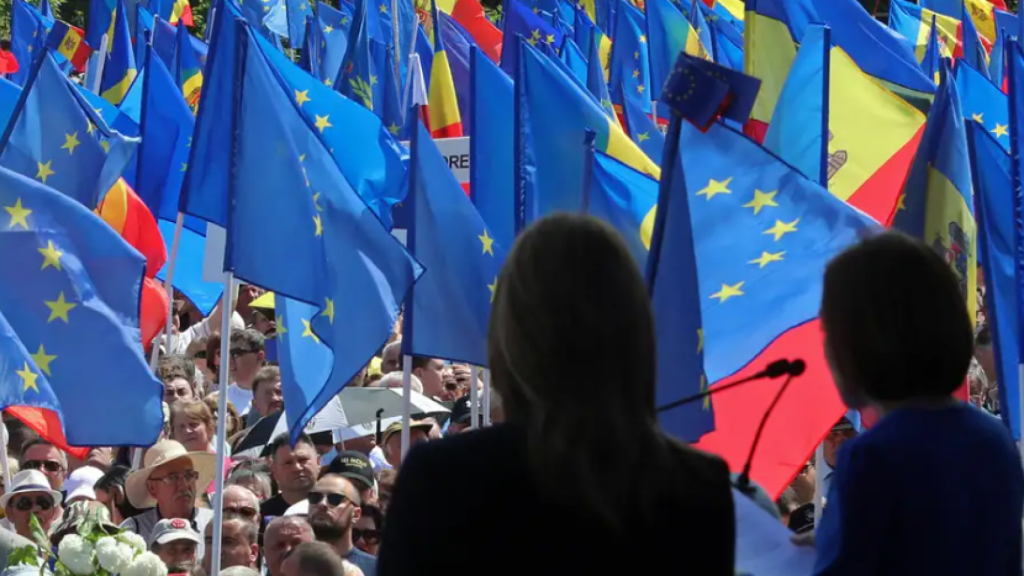Up to three Western countries – Canada, the United Kingdom and the United States – denounced this Thursday in the context of the G7 meeting in Italy the Kremlin interference attempts in Moldovan elections on October 20th. Due to its geographical location, Moldova has always been a country coveted by Vladimir Putin: it is a relatively small state trapped between Ukraine and Romania, with an important colony of Slavs on its territory.
Control of Moldova would mean for Russia a direct access to the Black Sea a few kilometers from the desired port of Odessa and would put pressure on Romania, a member state of NATO and the European Union. We must not forget that the pro-Russian secessionists from Transnistria, in the east of the country, have already de facto ruled this region since they declared their independence in 1990, even during the times of the USSR.
Since then, tensions have been constant. Russian troops have not left Transnistria in these three decades and continue to threaten both Ukraine to the east and Moldova to the west. As happened with the self-proclaimed republics of Donetsk and Lugansk in 2014, the international community does not recognize their legality, but the Transnistrians are willing to help Putin in whatever he needs and to victimize themselves in the face of alleged Moldovan repression.
The idea of a “false flag attack” like those experienced in Ukraine after the Euromaidan, serving as an excuse for the Russian army to take Transnistria and then secure more land to the west, has always been in the minds of Russian generals.
According to the statement from the three Anglo-Saxon powers, the plan would be closer than ever to being put into practice… unless, first, Putin gets the pro-European Maia Sandu lose the election to some pro-Kremlin candidate who has not yet run.
Maia Sandu, President of Moldova, greets Antony Blinken during a visit by the US Secretary of State to Chisinau.
Reuters
Russian unrest in Europe
For this, the Kremlin has its propaganda and lies machine ready. Russia only mobilizes its army when everything else has failed. In 2005, for example, he already tried to usurp the government of Kyiv poisoning the nationalist candidate, Viktor Yushenko. In the end, Yushenko recovered and managed to win, including an attempted punch, against the pro-Russian leader Viktor Yanukovych.
In 2016, Putin decided that he could not allow Hillary Clinton won the US elections: it put its secret services to work on social networks and Russian hackers even broke into the Democratic candidate’s private email. The scandal over what was found there sparked an FBI investigation that, although it ended up exonerating Clinton, was key to Trump’s victory in the elections. Since then, the New York tycoon has not missed the opportunity to praise the Russian autocrat in public and in private.
The tactic of clouding Western civil societies through the creation or financing of anti-establishment parties and continuous action on social networks has so far proven quite effective. When he has not achieved electoral success, he has at least sown doubt. The totalitarian movements of the left and right throughout the West would not be understood without the ideological and financial support of the Kremlin.
The most recent episode of this type of interference is the mysterious appearance of five wooden coffins placed next to the Eiffel Tower with the inscription “French soldiers killed in Ukraine”. The operation was directed from Moscow and sought, without a doubt, to raise awareness among the French people about President Emmanuel Macron’s decision to send troops and trainers to Ukraine… when he considered it appropriate and not when Putin allowed it.
Imminent entry into the EU
Now, Moldova is something else. Something more personal. In its attempt to return to the times of imperialist Russia and to its most recent incarnation, the Soviet Union, Putin is not willing to allow a territory in his orbit to enter the ranks of the supposed enemy.
Moldova and the European Union They have been in negotiations since March 2022, that is, a few weeks after the Russian invasion of Ukraine. In December 2023 it was agreed to start the accession processwhich should culminate on the aforementioned October 20 with the holding of a referendum.

Demonstration in favor of the European Union in Moldova.
Reuters
If Moldova enters the European Union, Russia will have one more reason to feel cornered. In fact, so far, what Putin has achieved with his attack on the Zelensky regime is to lose tens of thousands of men and watch how Finland and Sweden joined NATO while Moldova was looking for a place under the umbrella of the Union. In exchange, yes, it has consolidated its positions in the Donbas and in a good part of the southwest bank of the Dnieper.
Little more. Despite the eight months of offensive and the well-publicized Ukrainian limitations, Russia has real problems making significant progress. The alarms went off in April, when Gerasimov’s army reached Ocheretyne and Chasiv Yar, and the danger continued with a threatened offensive on the city of Kharkiv.
More than two months later, Chasiv Yar remains 90% in Ukrainian hands while Russian troops have been expelled from almost all of Vovchansk, north of the Kharkiv region.
In the face of military failure, Russia has doubled its diplomatic effortsforcing his allies to boycott the Swiss peace conference and discrediting the Zelensky government for not having called elections within the scheduled time. This same week, members of the far-right Alternative for Germany stood up from the German Congress in protest at Zelensky’s presence and insisted on his lack of legitimacy. The seed that is planted does not always germinate, but when it does, it triggers hatred and danger.















Add Comment